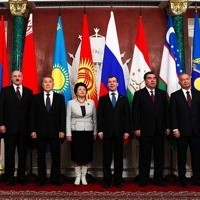Uzbekistan’s decision to withdraw from the Moscow-led Collective Security Treaty Organization (CSTO) highlights the dilemma confronting Russian President Vladimir Putin as he tries to strengthen Moscow’s pre-eminence among the former Soviet republics through the region’s multiple multilateral institutions.
The CSTO and other Moscow-led regional organizations have important symbolic value to Russia regardless of their actual effectiveness, because they affirm Moscow’s strategic primacy in the former Soviet space. The other member states accept this arrangement since it can yield some tangible benefits, such as economic and military assistance, as long as it does not overly constrain their freedom of action.
The loose organization and requirements of many of these structures, such as the Commonwealth of Independent States (CIS) and even the Shanghai Cooperation Organization, in which Moscow shares leadership with Beijing, allow for flexible arrangements in which some members can choose deeper integration -- as with the Belarus-Kazakhstan-Russia Customs Union -- while others can opt out of initiatives. The drawback is that many of the agreements nominally adopted by these structures are never implemented, with members often not ratifying the needed national legislation to bring them into force or else providing inadequate financing to support them.

